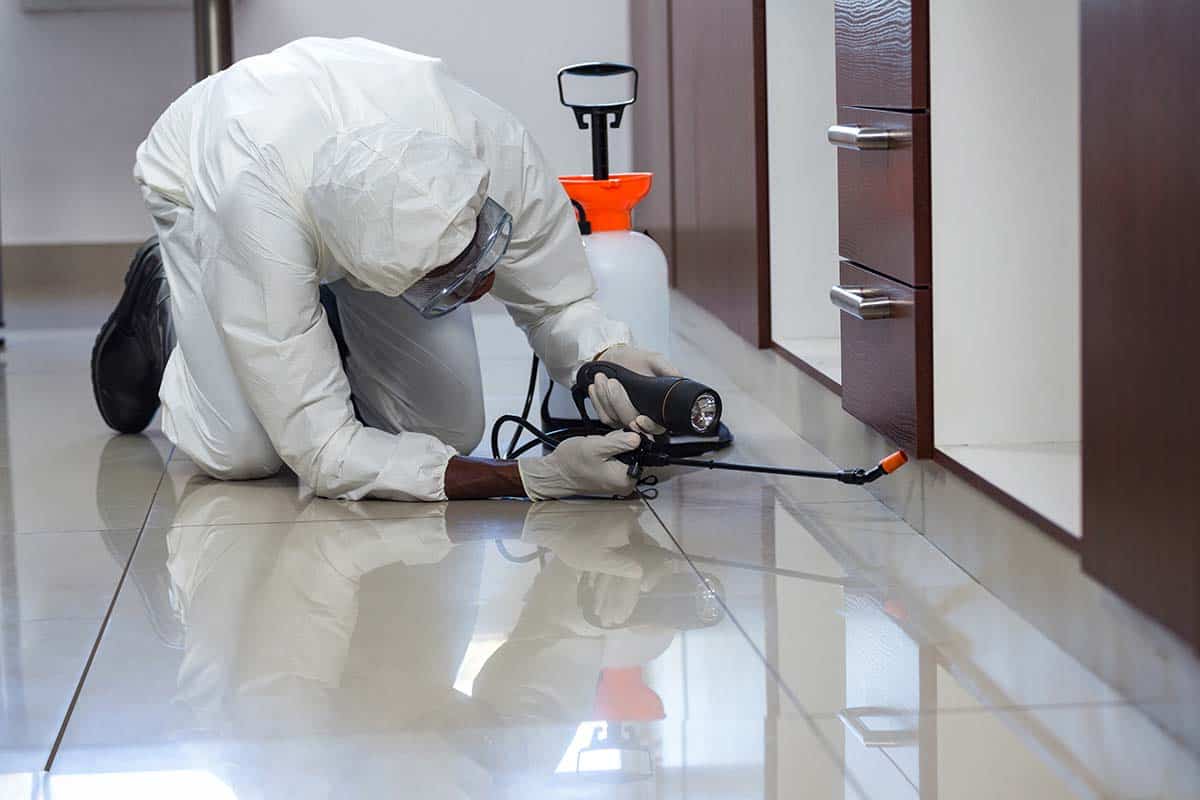Keeping bed bugs from spreading is a hard thing but isn’t impossible. These pest infestations are among some of the most commonly reported problems in American homes.
Bed bugs are a nightmare to have in the house. Just thinking about them can trigger your OCD as these dreadful creatures, barely 5mm in size and as thin as a piece of paper, survive on your blood. These little pests can crawl up to 30 meters to get the food and have survived for more than 3,500 years.
Though they cannot fly, they can spread very fast by being ‘hitch hikers’. Bed bugs travel through luggage and other belongings that you might have taken on a trip. For instance, if you have unknowingly brought a female bed bug that has already mated, it will start laying eggs in your home and multiply its population very quickly.
How To Keep Bed Bugs From Spreading?
Prevention is better than cure. As soon as you notice signs of bed bug infestation, you need to figure out a way to stop their outspread. Here are some practical measures you can take to prevent bed bugs from spreading:
1. Inspect your belongings regularly
If you have recently traveled, put out your belongings immediately for a thorough inspection. Take out your bag, socks, clothes, suitcases, and other belongings and check their seams, crevices, and cracks using a flashlight, a magnifying glass, and a thin piece of cardboard. Throw out things you can’t clean like notebooks.
If a guest has left your house, inspect the bedding, cupboards, carpets, and the curtains for any possible signs, particularly if your guest makes mention of having bed bugs in their own home.
Bed bugs can easily hide in shoes and loose garments. After coming home from work, dust off your shoes before getting inside or wear a new pair of slippers.
Since bed bugs are keen to reside in bedrooms, make sure you are regularly scanning the pillow covers, blankets, bedsheets, cushions, and curtains. Lift your mattress up, take out the mattress covers, and see if there are signs of infestation. Since they hide in crevices not thicker than a credit card, it can be difficult to spot them at first. But the sooner you are able to locate the infestation, the easier it gets to eliminate them completely.
2. Heat-treat your infested belongings
Bedbugs are not resilient to extreme heat and they can die at temperatures above 46 degrees Celsius. Using vacuum cleaners and steam cleaning your furniture, while washing and drying your clothes in extremely hot temperatures can be helpful.
After examining your home, deep clean your furniture such as sofa sets, mattresses, bed, curtains and carpets. Take off all the cushion covers, bed sheets, curtains, blankets and wash them in hot water, preferably using a bed bug detergent. Then dry them in a heat setting. Unload them in a bathing tub and shed them to remove any dead bed bugs.
Additionally, steam cleaning can be helpful in killing bed bugs hiding in the bed frames, box spring, headboard and footboard.
For your belongings, it is important to wash them in hot water for 1-2 hours and get dried in a hot setting for 30 minutes. Make sure to check the washing instructions though before putting your clothes in extreme heat. If they are too delicate, get them dry-cleaned.
In order to prevent the spread of bed bugs, you can even refrigerate your belongings in a freezer for one or two weeks if they are resistant to excessive heat.
3. Keep a bed bug prevention kit handy
A prevention kit is a necessary item if you travel frequently or live in a vicinity that is notorious for having bed bugs. The kit should include sealing plastic bags in which you can safely put your clothes, plastic sheets for covering your bed during travel, some wet wipes, plastic gloves, a flashlight for inspecting your room or vehicle and spray containing 70% -90% solution of isopropyl alcohol.
If you are experiencing bed bug bites or seeing noticeable signs of home infestation, you should consider investing in a bed bug kit which offers sprayer head as well as residual sprays that can rid you of the toughest infestations and kill bed bugs on spot. Make sure you opt for a bed bug spray that is completely safe for indoor use, has no odor and does not stain.
4. Clean up the clutter

It is very important to clean the clutter around your bedroom as these pesky insects can hide their eggs in clothes.
Do not create piles of dirty shirts, socks, or linens for your laundry – avoid mixing linens and bed covers with your work clothes. Don’t overlap pillows and cushions as one thing may infect another. Don’t put your belongings in a pile inside your cupboard or underneath the bed.
If you own a pet and notice any bugs on them, talk to the vet about using a product to get rid of any bed bugs on the pet’s fur. Although bed bugs don’t live on pets, they can possibly transport bed bugs back in your home even after you have exterminated the house.
5. Avoid moving furniture between rooms
Bed bug infestation commonly increases after months of ignoring. As these are skilled travelers, they can easily move from one room to another and can survive without food for months.
This is why it is important that you don’t move around the furniture between rooms as it can contain unhatched and undetected eggs of the bed bugs. Don’t move any couches from your living room to the main bedroom.
6. Store personal items securely in your vehicle
When you travel, put your personal items securely in sealed bags and tuck them in the boot of the car. Make sure that the car is not already infested by the bugs. When you unload the bags, quickly wash your clothes and get your vehicle a thorough inside car wash frequently.
7. Carry disposable plastic bags when traveling
Carrying disposable plastic bags that can seal your clothes and personal belongings is a good way to stop any contact with bed bugs. Take your clothes out of a heat-dried state and put them directly in the plastic bags.
During your travel, dump the used clothes separately in plastic bags and seal them completely so that no bugs can escape. You can double seal your clothes as an additional preventive measure.
Avoid putting the sealed plastic bags in your suitcase to avoid any chance of causing an infestation in your other clothes and belongings. When you get home, instantly put your clothes in hot water and wash them to kill eggs and bugs.
8. Be careful when staying at a hotel
While staying at a hotel, make sure that you first confirm with the manager about the cleanliness. Check the hotel mattresses for any brownish spots or blood spots; also scan the furniture and walls.
Do not choose a hotel with a reputation for infestation or having unhygienic conditions. Read customer reviews online before making a decision. Infestation via hotel rooms is quite common as management doesn’t pay heed to their walls, cupboards, or bedding.
Secondly, since hotel rooms are used by multiple guests, a person prior to you might have brought a bed bug that no one knows about.
Take a plastic sheet with you and a disposable bed sheet. Take off the hotel’s bed sheet when you check-in and cover the mattress with the plastic sheet and then a disposable sheet you brought. Avoid using the hotel’s other furniture as much as you can. Covering your suitcase with a plastic bag may also help prevent spread infestation further.
9. Hire a bed bug treatment professional

Using DIY bed bug solutions is not for everyone, especially when you don’t know how to choose the right treatment spray. Hiring a company that deals with bed bugs is a popular and comparatively safe option.
The exterminators have detailed knowledge about the biology and hiding places of the bed bugs. Getting a weekly spray done in all your rooms can kill the growing infestation. They can recommend the right products and give helpful tips to stop bed bugs from spreading.
Also, the exterminator can detect where the bugs might be coming from by finding escape holes in the walls. They will also suggest blocking any sources from where the bugs might be traveling.
Frequently Asked Questions
Can bed bugs be transferred from person to person?
Bed bugs can easily be transferred from person to person. Be it your relative, colleague, a friend, or a neighbor, bed bugs can transfer on contact. They can easily stick to a person’s clothes without making any notice and drop themselves off in an uninfested zone.
How do you keep bed bugs from spreading to other rooms?
You can keep bed bugs from spreading in other rooms by not moving the furniture, clothes, or bedding between rooms. If there are any escape holes between walls, make sure to block those to restrict their movement. You can also recognize them by muddy droppings in the corners of the walls or underneath the bed. The best way to eliminate them is to not let them grow by checking your furniture and bedding regularly.
How do you know how bad your bed bug infestation is?
There are some signs that can help you understand the severity of infestation. In the first month, the bed bug infestation is usually not visible. After almost two months of multiplication, you will find reddish-brown spots, specks of dirt and particles on your mattress. At this point, the bed bug infestation can be controlled. It can start from a single pregnant bed bug and populate into colonies of about 8,000 breeding adults, 100,000s of developing nymphs, and 50,000 to 60,000 eggs waiting to hatch.
